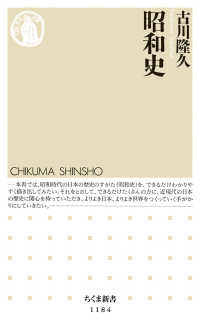- ホーム
- > 洋書
- > 英文書
- > Literary Criticism
Full Description
Love, Honour and God tells about the talented and determined people who challenged the dominance of the Persophone written culture and created literature in their mother tongue, Pashto. Offering insights into the lives and literary accomplishments of many acclaimed and less known Pashtun authors of the early modern period, this book traces the development of Pashto writings from around 1530 to 1830 as a considered pursuit of an educational mission and a verbal affirmation of ethnic identity. Based primarily on original texts in Pashto verse and prose, the book explores social views, aesthetic preferences and spiritual values that underlie modern ideologies and cultural awareness of Pashto-speaking communities in Afghanistan and Pakistan.
Contents
Acknowledgements
Introduction
1 Chronological Framework
2 Primary Textual Material
3 Objectives and Approaches
4 The State of Research
5 Conceptual Framework
6 Transliteration
1 Pashto Handwritten Books
1.1 Pashto Writings and Folklore
1.2 Manuscripts of Pashto Writings
1.3 Chronology of Manuscripts
1.4 Centres of Pashto Book Culture
1.5 Copyists
1.6 The Life of Manuscripts
2 The Emergence of Pashto Writings
2.1 The Beginnings of the Pashto Written Tradition
2.2 The First Books in Pashto
2.3 Islam and the Emerging Pashto Literature
3 The Roshani Literature
3.1 The Life of Bayazid Ansari
3.2 The Works of Bayazid Ansari
3.3 The Older Generation of the Roshani Authors
3.4 Mirza Khan Ansari
3.5 The Roshani Poets of India
3.6 Forms and Content of the Roshani Poetry
3.7 The Doctrinal Foundations of the Roshani Poetry
4 The Religious Writings of Sunni Teachers and Spiritual Masters
4.1 Common Features of the Early Religious Writings in Pashto
4.2 Akhund Darweza
4.3 The Makhzan al-islam and Its Authors
4.4 The Continuation of the Makhzan's Traditions
4.5 Early Pashto Poetry in the Indo-Afghan Diaspora
5 Khushhal Khan Khatak
5.1 Early Years (1613-1641)
5.2 The Tribal Ruler (1641-1664)
5.3 The Prisoner of the Mughals (1664-1668)
5.4 The Mughal-Afghan War (1672-1676)
5.5 Later Years (1677-1689)
5.6 Literary Activities and Creative Development
5.7 The Diwan
5.8 The mas̱nawī Poems
5.9 Prose Works
6 The Khatak Literary Circle
6.1 Ashraf Khan Hijri
6.2 ʿAbd al-Qadir Khan
6.3 Sadr Khan
6.4 Sikandar Khan
6.5 Afzal Khan
6.6 Other Khatak Literati
6.7 The Followers of Shaykh Rahmkar
7 The Development of Classical Traditionalism
7.1 ʿAbd al-Rahman Momand (Rahman Baba)
7.2 ʿAbd al-Hamid Momand
7.3 Mystical-Philosophical and Love Lyrics
7.4 Religious and Didactical Writings
7.5 Literary Life in the Hotak Dominion of Qandahar
8 Pashto Writings in the Durrani State
8.1 Pashto Literature at the Court of the Durrani Monarchs
8.2 The Poets of Pashtunkhwa
8.3 The Family of Tsamkani Sheikhs
8.4 ʿAli Akbar Orakzay
8.5 Religious Works and Hagiography
8.6 Stories in Verse and Prose
9 Pashto Writings beyond Pashtunkhwa
9.1 Politics and Literature in Rohilkhand
9.2 The Family of Hafiz Rahmat Khan Barets
9.3 Kazim Khan Shayda
9.4 Pashto Poetry in Bukhara
Concluding Notes
Bibliography
Index






